|
Books Should Be Free Loyal Books Free Public Domain Audiobooks & eBook Downloads |
|
|
Books Should Be Free Loyal Books Free Public Domain Audiobooks & eBook Downloads |
|
Top Authors |
|---|
|
Book type:
Sort by:
|
By: H. Beam Piper (1904-1964) | |
|---|---|
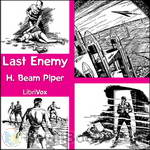 Last Enemy
Last Enemy
An undercover Paratimer has disappeared on assignment while in an alternate time line, and it’s up to Verkan Vall of the Paratime Police to save her. To do so, he must infiltrate a universe in which assassination is an honorable profession, and reincarnation a scientific fact. Will Verkan Vall survive in a world of killers and the undead? | |
 Null-ABC
Null-ABC
"There's some reaction these days that holds scientists responsible for war. Take it one step further: What happens if "book-learnin'" is held responsible ...?" | |
 Temple Trouble
Temple Trouble
I'll bet you did not know that our little earth is not limited to the single time line on which we happen to exist. That's right; There are actually thousands, no many millions of parallel times, each existing alongside all the rest, using the same real estate, but following their own path. Some extremely primitive, some very advanced, but all blissfully unaware of the others. Of course this does not affect us at all, unless ... unless one of these time lines discovers the existence of the others and then a way to move easily back and forth from one to the other... | |
 Time Crime
Time Crime
The Paratime Police had a real headache this time! Tracing one man in a population of millions is easy--compared to finding one gang hiding out on one of billions of probability lines! | |
 Time and Time Again
Time and Time Again
| |
 He Walked Around the Horses
He Walked Around the Horses
| |
 Genesis
Genesis
| |
 The Answer
The Answer
| |
 Flight From Tomorrow
Flight From Tomorrow
| |
 Crossroads of Destiny
Crossroads of Destiny
| |
 The Mercenaries
The Mercenaries
| |
 Rebel Raider
Rebel Raider
| |
 Day of the Moron
Day of the Moron
| |
 Graveyard of Dreams
Graveyard of Dreams
| |
 Naudsonce
Naudsonce
Naudsonce? What does THAT mean? Well, to find out you will need to listen to this story where Piper's unique mind explores what we mean by 'communication' and how it happens. The joint Space Navy-Colonial Office expedition was looking for new planets suitable for colonization; they had been out, now, for four years, which was close to maximum for an exploring expedition. They had entered eleven systems, and made landings on eight planets. Three had been reasonably close to Terra-type but were all disqualified by terrible animals or warlike inhabitants... | |
 The Keeper
The Keeper
| |
 Operation R.S.V.P.
Operation R.S.V.P.
| |
 Ullr Uprising
Ullr Uprising
| |
 Dearest
Dearest
| |
By: Alexander Hamilton (1755/1757-1804) | |
|---|---|
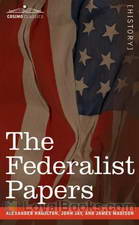 The Federalist Papers
The Federalist Papers
In order to promote the ratification of the United States Constitution in the late 1780s, Alexander Hamilton, James Madison and John Hay wrote a series of 85 articles and essays explaining their reasons to support the constitution. Most of these articles were published in The Independent Journal and The New York Packet and they later became known as “The Federalist Papers.” In reading the articles, one will encounter very interesting issues like Hamilton’s opposition to including the Bill of Rights in the Constitution and why he thinks a Union is better than a Confederation... | |
By: Arnold Bennett (1867-1931) | |
|---|---|
 How to Live on Twenty-Four Hours a Day
How to Live on Twenty-Four Hours a Day
This book is a classic piece on self improvement teaching you to live to the fullest. Judging from the title of the book, the reader might expect that the book is a manual on how to manage your time better. Nothing could be further from the truth, this book is a flowery and witty self help book aimed at helping readers improve the quality of their lives, in fact it is one of the firsts of its kind in the world. Bennett describes the twenty four hours in a day as a miracle and that it should be used for the betterment of health, wealth, respect, pleasure and contentment... | |
 Mental Efficiency and Other Hints to Men and Women
Mental Efficiency and Other Hints to Men and Women
Mental Efficiency and Other Hints to Men and Women is one of the many self help books that Bennett wrote, the most famous of these being How to Live 24 Hours a Day. It is highly readable, amusing and offers wisdom in an extremely palatable form. Bennett's gift for analysis and his knowledge of philosophy and psychology make this book a valuable treasure trove of handy hints to improve our lives. Though it was first published in 1911, it remains as relevant, wise and useful as it did more than a hundred years ago... | |
 The Card
The Card
The ‘Card’ in question is Edward Henry Machin – his mother called him ‘Denry.’This light-hearted story is of his rise from humble beginnings as the son of a washerwoman and sempstress in the last quarter of the nineteenth century, in the pottery towns (which Arnold Bennett christened ‘The Five Towns’) of the English Midlands; how, by his own wits, enterprise and ‘nerve’ he rose to wealth, married bliss and public recognition as the youngest-ever mayor of his home town. “’And yet,’ demanded Councillor Barlow, ‘what’s he done? What great cause is he identified with?’‘He’s identified,’ said the speaker, ‘with the great cause of cheering us all up’.” | |
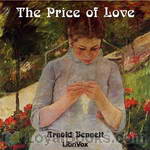 The Price of Love
The Price of Love
Rachel Louise Fleckring works for the elderly Mrs Maldon, and although with the woman for only a short time, she is taken into the heart of the family. She falls in love with one of Mrs Maldon’s descendents, but along the way, she has to come to terms with the fact that he isn’t, perhaps, the perfectly honest man she thought he was. | |
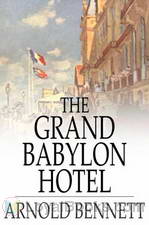 The Grand Babylon Hotel
The Grand Babylon Hotel
Theodore Racksole, a rich American multi-millionaire, buys the Grand Babylon Hotel, a luxurious hotel in London, as a whim – and then finds out there are strange things going on – a German prince is supposed to arrive but never turns up, someone is found murdered in the hotel, but then the body disappears. With the help of his independent daughter Nella and another German prince, Racksole sets out to solve the mystery.Bennett wrote this as a 15-part serial, for a lark, in 15 days, and sold it for 100 pounds. It first appeared in The Golden Penny in 1902, which described it as “the most original, amusing, and thrilling serial written in a decade”. | |
 The Old Wives' Tale
The Old Wives' Tale
The Old Wives’ Tale is a novel by Arnold Bennett, first published in 1908. It deals with the lives of two very different sisters, Constance and Sophia Baines, following their stories from their youth, working in their mother’s draper’s shop, into old age. It is generally regarded as one of Bennett’s finest works. It covers a period of about 70 years from roughly 1840 to 1905, and is set in Burslem and Paris. | |
 Literary Taste: How to Form It
Literary Taste: How to Form It
Arnold Bennett describes a method for enjoying literature, and suggests the contents of a comprehensive library. Chapters 1-10 and 14 describe his method for learning to enjoy literature. Chapters 11, 12, and 13 contain detailed lists of the 337 volumes required to complete a comprehensive library of English works. This reading is from the 1913 version at Project Gutenberg, and so does not contain the revisions made by Swinnerton for the 1939 edition, which included authors of the early Twentieth Century. Swinnerton’s revisions are available from Wikipedia. | |
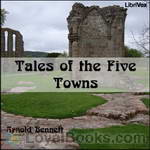 Tales of the Five Towns
Tales of the Five Towns
This is a selection of short stories recounting, with gentle satire and tolerant good humour, the small town provincial life at the end of the nineteenth century, based around the six towns in the county of Staffordshire, England, known as the Potteries. Arnold Bennett chose to fictionalize these towns by changing their names and omitting one (Fenton) as he apparently felt that “Five Towns” was more euphonious than “Six Towns”. The real town names which are thinly disguised in the novel are: Hanley, Longton, Burslem and Tunstal, the fifth, Stoke became “Knype”... | |
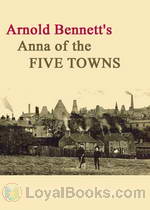 Anna of the Five Towns
Anna of the Five Towns
The plot centers on Anna Tellwright, daughter of a wealthy but miserly and dictatorial father, living in the Potteries area of Staffordshire, England. Her activities are strictly controlled by the Methodist church. Having escaped her father by marrying the respectable and attractive Henry, she attempts in vain to help Willy, son of a drunken and bankrupt business associate of her father's. | |
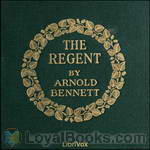 The Regent
The Regent
'The Regent' is, if not a sequel to 'The Card', then a 'Further Adventures of' the eponymous hero of that novel.Denry Machin is now forty-three and begins to feel that he is getting old, that making money and a happy home life are not enough and that he has lost his touch as the entrepreneur and entertainer of the 'Five Towns'.In fact, as he says to himself 'What I want is change - and a lot of it too!'. A chance meeting at the local theatre leads to his going to London and then... | |
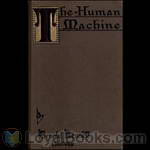 The Human Machine
The Human Machine
Bennett asks us to consider our brains as the most wonderful machine, a machine which is the only thing in this world that we can control. As he writes: "I am simply bent on calling your attention to a fact which has perhaps wholly or partially escaped you -- namely, that you are the most fascinating bit of machinery that ever was."As ever, his prose is honeyed, his thoughts inspired, and his advice as relevant today as when it was written. (Introduction by Ruth Golding) | |
 Hilda Lessways
Hilda Lessways
This book is the second in Bennett’s four books about life in the Five Towns (the real life Potteries in Staffordshire). It tells the story of Hilda before her marriage to Edwin Clayhanger (from the first book). Bennett explores Hilda's ambition to make a career for herself, her coming of age and her working experiences as a shorthand clerk and keeper of a lodging house in London and Brighton. He also shows her intensifying relationship with the enigmatic George Cannon that ends in her disastrous bigamous marriage and pregnancy, and finally her reconciliation with Edwin Clayhanger | |
 Clayhanger
Clayhanger
This first of a trilogy of novels is a coming-of-age story set in the Midlands of Victorian England, following Edwin Clayhanger as he leaves school, takes over the family business, and falls in love.The books are set in Bennett's usual setting of "the 5 Towns", a thinly-disguised version of the six towns of "the Potteries" which amalgamated (at the time of which Bennett was writing) into the borough (and later city) of Stoke-on-Trent.In one of the earlier chapters in the book, Bennett writes that... | |
 Buried Alive
Buried Alive
The hero is Mr Priam Farll, a painter of considerable ability. He is, however, extremely shy – so shy that when his valet, Henry Leek, dies suddenly, the doctor believes the dead man to be Priam Farll and the live man the valet. The artist does not try to disabuse him. After the funeral (in Westminster Abbey), Priam Farll marries a widow and lives a happy life until the loss of his wife’s money means he has to take up painting again. A connoisseur of art recognises his style but thinks the paintings are by an imposter... | |
 Sacred and Profane Love
Sacred and Profane Love
| |
 Pretty Lady
Pretty Lady
‘The Pretty Lady’ is considered to be one of Bennett's most revealing and under-rated works. It is the story of a French prostitute, Christine, who has escaped from wartime Ostend, and set herself up in business in London. Though a refugee, she demands no pity; she is self-sufficient, practical and realistic. Christine is not a harpy preying on innocent soldiers, but a canny businesswoman, doing the best she can with the opportunities life has given her. Her main relationship is with G.J. Hoape, a wealthy man above the military age... | |
 The Feast of St. Friend
The Feast of St. Friend
| |
 Journalism for Women A Practical Guide
Journalism for Women A Practical Guide
| |
 Ghost: A Modern Fantasy
Ghost: A Modern Fantasy
The novel opens with Carl Foster, a recently qualified doctor, coming to London to try and make his fortune. He meets a famous tenor, Signor Alresca, who suffers a dreadful injury backstage and Foster tends to him. He thus meets the lead soprano, Rosetta Rosa, and falls hopelessly in love with her.Alresca takes Foster under his wing and they travel to Alresca's home in Bruges. It is clear to Foster that Alresca has some strange obsession. Foster also notices a stranger who seems to be dogging his footsteps.Things take an even more sinister turn when Alresca inexplicably dies. . . | |
 The Author's Craft
The Author's Craft
| |
 Matador of the Five Towns and Other Stories
Matador of the Five Towns and Other Stories
Twenty-two short stories by Arnold Bennett, mainly set in the 'Five Towns', Bennett's name for the pottery manufacturing towns of the English midlands | |
 The Great Adventure
The Great Adventure
| |
 The Roll-Call
The Roll-Call
| |
 Hugo A Fantasia on Modern Themes
Hugo A Fantasia on Modern Themes
| |
 Books and Persons Being Comments on a Past Epoch 1908-1911
Books and Persons Being Comments on a Past Epoch 1908-1911
| |
 The Lion's Share
The Lion's Share
| |
 The Plain Man and His Wife
The Plain Man and His Wife
| |
 Judith, a play in three acts Founded on the Apocryphal Book of Judith
Judith, a play in three acts Founded on the Apocryphal Book of Judith
| |
 The Title A Comedy in Three Acts
The Title A Comedy in Three Acts
| |
By: Grenville Kleiser (1868-1953) | |
|---|---|
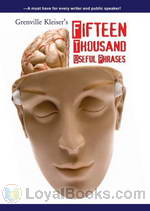 Fifteen Thousand Useful Phrases
Fifteen Thousand Useful Phrases
Fifteen Thousand Useful Phrases is a practical handbook written by Grenville Kleiser. Grenville is known for his writings on humor, positive thinking and inspirational thought. This serves as a handbook of pertinent expressions, striking similes and terms for embellishing speech and literature. This book can be used to improve vocabulary for reading, writing and speaking alike. Through mastery of words, the most powerful and perfect expression of thought can be delivered orally. Choosing the correct words conveys ideas in a crisp and clear way that will hold and audience's attention... | |
 The World's Great Sermons, Basil to Calvin
The World's Great Sermons, Basil to Calvin
| |
 Successful Methods of Public Speaking
Successful Methods of Public Speaking
| |
 Model Speeches for Practise
Model Speeches for Practise
| |
 Phrases for Public Speakers and Paragraphs for Study
Phrases for Public Speakers and Paragraphs for Study
| |
 The Training of a Public Speaker
The Training of a Public Speaker
| |
 Talks on Talking
Talks on Talking
| |
By: Wilkie Collins (1824-1889) | |
|---|---|
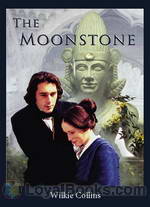 The Moonstone
The Moonstone
A young woman who inherits a beautiful diamond known as The Moonstone on her eighteenth birthday becomes the center of this mystery story. The diamond is a gift from an uncle who once served as an army officer in British India. She proudly wears the jewel on her dress at her birthday party that night. The precious stone has a dark and sinister history, which will have a terrible impact on her life and the lives of those around her. You're about to read what's been termed the very first real detective story in the English language... | |
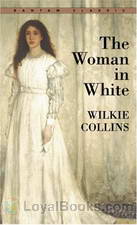 The Woman in White
The Woman in White
Wilkie Collins’s The Woman in White tells the story of two half-sisters, Laura Fairlie and Marian Halcombe who were embroiled in the sinister plot of Sir Percival Glyde and Count Fosco to take over their family’s wealth. It’s considered to be one of the first “sensation novels” to be published. Like most novels that fall into this category, the protagonists here are pushed to their limits by the villains before they finally got the justice they deserved. The story begins with Walter Hartright helping a woman dressed in white who turned out to have escaped from a mental asylum... | |
 The Haunted Hotel, A Mystery of Modern Venice
The Haunted Hotel, A Mystery of Modern Venice
A kind, good-hearted genteel young woman jilted, a suspicious death or two that only a few think could be murder, strange apparitions appearing in an hotel all combine to create a horrifying conundrum. Who was the culprit and will finding out finally put an end to the mystery? | |
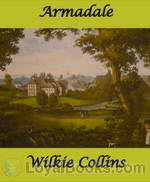 Armadale
Armadale
The novel has a convoluted plot about two distant cousins both named Allan Armadale. The father of one had murdered the father of the other (the two fathers are also named Allan Armadale). The story starts with a deathbed confession by the murderer in the form of a letter to be given to his baby son when he grows up. Many years are skipped over. The son, mistreated at home, runs away from his mother and stepfather, and takes up a wandering life under the assumed name of Ozias Midwinter.” | |
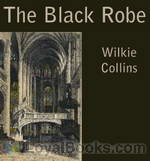 The Black Robe
The Black Robe
The church has lost out on a valuable piece of land through wars and transfers. Father Benwell is determined to reclaim that property by the conversion of the owner, Lewis Romayne. Enter beautiful Stella, who captures the heart of Romayne. Should Stella capture the love and devotion of Romayne, Father Benwell's scheme would fail, and that is something that he can not allow. Complicating things is the fact that both Romayne and Stella are hiding their own terrible secrets.The Black Robe is an 1881 epistolary novel by famed English writer, Wilkie Collins. The book centers around the misadventures of Lewis Romayne, and is also noted for a perceived anti-Catholic bias | |
 No Name
No Name
The story begins in 1846, at Combe-Raven in West Somersetshire, the country residence of the happy Vanstone family. When Andrew Vanstone is killed suddenly in an accident and his wife follows shortly thereafter, it is revealed that they were not married at the time of their daughters' births, making their daughters "Nobody's Children" in the eyes of English law and robbing them of their inheritance. Andrew Vanstone's elder brother Michael gleefully takes possession of his brother's fortune, leaving his nieces to make their own way in the world... | |
 I Say No
I Say No
Emily Brown is an orphan girl that almost no one can help but love when they meet her. She is pursued by two worthy men: Mr. Alban Morris, the drawing master at her school; and Rev. Miles Mirabel, a clergyman. However, one of them is lying to her after she discovers that her father's death wasn't natural, as she was led to believe. (Introduction by TriciaG) | |
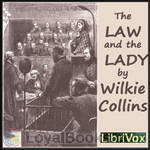 The Law and the Lady
The Law and the Lady
Valeria Brinton marries Eustace Woodville despite objections from Woodville's family leading to disquiet for Valeria's own family and friends.Just a few days after the wedding, various incidents lead Valeria to suspect her husband is hiding a dark secret in his past and she discovers that he has been using a false name. He refuses to discuss it leading them to curtail their honeymoon and return to London where Valeria learns that he was on trial for his first wife's murder by arsenic. He was tried in a Scottish court and the verdict was 'Not Proven' rather than 'not guilty' implying his guilt but without enough proof for a jury to convict him... | |
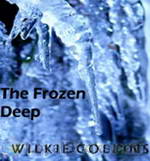 The Frozen Deep
The Frozen Deep
The Frozen Deep is a story of a love triangle between Clara, Frank and Richard, spiced up with dangerous expeditions, mysterious visions and life-threatening circumstances. The end is as surprising and unexpected as we are (or are not) accustomed to in Collins' books. | |
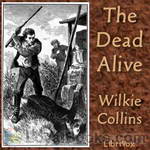 The Dead Alive
The Dead Alive
Ill feelings exist between the Meadowcroft sons and John Jago, the foreman of the Meadowcroft estate. Then, John Jago disappears, and a body is found in a kiln. The Meadowcroft brothers stand accused of the crime, but are they guilty? The Dead Alive is a novel written by Wilkie Collins based on the true-life Boorn Brothers murder conviction case of 1819. Jesse and Stephen Boorn were sentenced to death for the murder of their brother-in-law, but were they wrongly convicted? | |
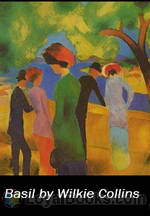 Basil
Basil
Basil, son of a father who values the family pedigree and who would not let him marry below his station, falls in love at first sight with a girl he sees on a bus. He stalks her and discovers she is Margaret Sherwin, only daughter of a linen draper. He stalks her and persuades her father to let him marry her secretly. He agrees on the condition, that, as his daughter is only seventeen, they live apart for the first year. At first the secret works, but then the mysterious Mannion, whose emotions cannot be read in his face, returns from abroad. On the last night of the year Basil follows Margaret and Mannion and discovers them in flagrante delicto. (Wikipedia) | |
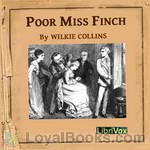 Poor Miss Finch
Poor Miss Finch
"Poor Miss Finch." That is what everyone calls the courageous protagonist of this book. In other words, "poor thing, she's blind, isn't it awful?" Ha! Lucilla Finch is the wisest of all the characters, in spite of, and perhaps because of, her blindness. This story is about her trials, tribulations and triumphs. She reminds me of myself. Not the falling recklessly in love and being pulled this way and that by foolish young men and mad old doctors. I mean that, like her, I'm blind and proud of it! (Introduction by Sandra G) | |
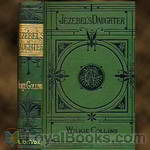 Jezebel's Daughter
Jezebel's Daughter
A brilliant chemist and a shrewd businessman — die on the same day. The widow of the chemist, Mrs. Fontaine, is left with the poisons he was researching , while Mrs. Wagner is left with her husband's mental health institution reforms and his plans for hiring women along with men in his firm's offices. Mrs. Wagner believes in treating madmen gently, and requests for the funny little man Jack Straw to be released from the madhouse. At the same time, her nephew David Glenney is sent to the Frankfurt office, where he works with Mr Engelmann and Mr Keller... | |
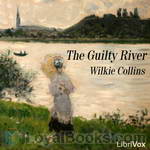 The Guilty River
The Guilty River
After his father’s death Gerard Roylake returns from Germany to take up his inheritance at Trimley Deen. On one evening he meets his childhood friend, Cristel Toller. They fall in love, but there is a crux. A deaf man, called The Lodger is obsessed with Cristel. He invites Gerard to tea with evil intentions… and Gerard accepts the invitation.The book is written in the first person and tells the story from Gerard's point of view. | |
 Hide and Seek
Hide and Seek
The artist Valentine Blyth has a very generous heart. He lovingly cares for his invalid wife, rescues a deaf orphan girl from maltreatment in a traveling circus and adopts her, and mentors a young man who gets in trouble with his tyrannical father. The girl, who received the nickname ‚Madonna’, falls in love with the young man, Zack. Because one of Valentine’s biggest fears is that Madonna’s blood relations will one day trace her and take her away from his home, he keeps the little that he knows of her origins a strict secret... | |
 Queen of Hearts
Queen of Hearts
The elderly Brothers Owen, Morgan and Griffith live a quiet, retired life in the countryside, which is turned upside-down by Griffith's ward, the young Jessie Yelverton. Originally, her visit to them was to last only six weeks, but for a very certain reason, the gentlemen must find a way to prolong her visit and get Jessie to stay for ten more days. To make her stay, they promise to tell her an entertaining and exciting story each night... | |
 Man and Wife
Man and Wife
This 1870 novel by Wilkie Collins centers around a peculiarity of Scottish law of that time, according to which any man and woman 'who were legally entitled to marry and who asserted that they were married before witnesses, or in writing, were regarded in Scotland as being married in law.' This strange law causes the characters Arnold and Geoffrey both possibly accidentally marrying Anne, though one is engaged to another woman and the other is searching for a more wealthy wife to accomodate his lifestyle. In these circumstances, Anne needs to catch an actual husband in order to save her reputation... | |
 Evil Genius
Evil Genius
The Evil Genius, one of Wilkie Collins' last works, is subtitled "A Domestic Scene". It is the intriguing tale of family Linley, including the "evil genius", and their governess Sydney Westerfield. In colorful pictures, Collins presents the story of this family, which becomes entangled in the often hyprocritical Victorian perceptions of morality and decency. | |
 Miss or Mrs.?
Miss or Mrs.?
Natalie Graybrooke is in love with her cousin Launcelot Linzie, but engaged to Mr. Turlington, an older man who covets her fortune and whom she detests. Turlington is the executor of Natalie's father's estate. When Natalie secretly marries her cousin, Turlington arranges to have Natalie's father murdered, to gain control of his fortune. | |
 Antonina
Antonina
| |
 Rogue's Life
Rogue's Life
"[T]he story offers the faithful reflection of a very happy time in my past life. It was written at Paris, when I had Charles Dickens for a near neighbor and a daily companion, and when my leisure hours were joyously passed with many other friends, all associated with literature and art, of whom the admirable comedian, Regnier, is now the only survivor. The revising of these pages has been to me a melancholy task. I can only hope that they may cheer the sad moments of others. The Rogue may surely claim two merits, at least, in the eyes of the new generation—he is never serious for two moments together; and he "doesn't take long to read." W. C." | |
 Little Novels
Little Novels
| |
 A Fair Penitent
A Fair Penitent
| |
 Two Destinies
Two Destinies
Mary Dermody is destined to be together with George Germaine one day, or so at least her grandmother prophesizes. Destiny at first doesn't seem to adhere to this plan, and the pair is separated and lose sight of each other. But when George saves a young woman from drowning, a strong connection seems to develop between them, which seems to be almost supernatural.. | |
 Rambles Beyond Railways; or, Notes in Cornwall taken A-foot
Rambles Beyond Railways; or, Notes in Cornwall taken A-foot
| |
By: Stephen Crane (1871-1900) | |
|---|---|
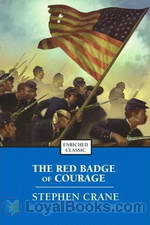 The Red Badge of Courage
The Red Badge of Courage
The Red Badge of Courage is a fiction that tells the story of a soldier named Henry Fleming during the American Civil War. The novel gained widespread praise from critics and was also a commercial success shortly after its release and made Stephen Crane an instant celebrity at the young age of 24. In the novel, Henry was one of the enlisted soldiers in the 304th New York Regiment. He flees from battle in one of the skirmishes they had against the Confederates and to hide his cowardice, he attempted to inflict a wound to himself which is referred to as the “red badge of courage... | |
 Selected Short Stories
Selected Short Stories
At the time of his death at the age of 28, Stephen Crane had become an important figure in American literature. He was nearly forgotten, however, until two decades later when critics revived interest in his life and work. Stylistically, Crane's writing is characterized by vivid intensity, distinctive dialects, and irony. Common themes involve fear, spiritual crises and social isolation. Although recognized primarily for The Red Badge of Courage, which has become an American classic, Crane is also known for short stories such as "The Open Boat", "The Blue Hotel", "The Bride Comes to Yellow Sky", and The Monster... | |
 War is Kind (collection)
War is Kind (collection)
Published in 1899, just a year before his death, War Is Kind by Stephen Crane evokes again the dark imagery of war which made his fortune in The Red Badge Of Courage. Unlike that book, this collection leaves the battlefield itself behind to explore the damage war does to people’s hearts and minds. Reeking of dashed hopes, simultaneously sympathetic with the victims of war and cynical about the purposes of war, Crane implicitly criticizes the image of the romantic hero and asks if Love can survive... | |
 Maggie, a Girl of the Streets
Maggie, a Girl of the Streets
| |
 The Monster and Other Stories
The Monster and Other Stories
| |
 The Little Regiment
The Little Regiment
| |
 Active Service
Active Service
| |
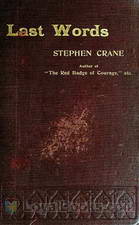 Last Words
Last Words
| |
 The Third Violet
The Third Violet
| |
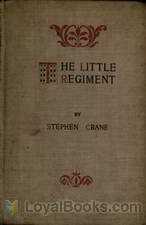 The Little Regiment And Other Episodes of the American Civil War
The Little Regiment And Other Episodes of the American Civil War
| |
By: Anicius Manlius Severinus Boethius (480-524/525) | |
|---|---|
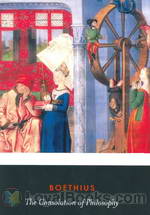 The Consolation of Philosophy
The Consolation of Philosophy
Consolation of Philosophy (Latin: Consolatio Philosophiae) is a philosophical work by Boethius written in about the year 524 AD. It has been described as the single most important and influential work in the West in medieval and early Renaissance Christianity, and is also the last great work that can be called Classical. Consolation of Philosophy was written during Boethius’ one year imprisonment while awaiting trial, and eventual horrific execution, for the crime of treason by Ostrogothic King Theodoric the Great... | |
 The Theological Tractates and The Consolation of Philosophy
The Theological Tractates and The Consolation of Philosophy
| |
By: Plato (427-347) | |
|---|---|
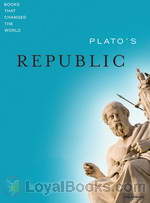 Plato's Republic
Plato's Republic
Plato's Republic is a Socratic dialogue which deals mainly with the definition of justice, the characteristics of a just city state and the just man. Although it was written more than two thousand years ago, many of the ideas and thoughts expounded here are still very much relevant to modern society. This is Plato's best known work and is also considered his most influential especially when it comes to the fields of philosophy and political theory. The Republic is divided into ten books and in each book Socrates discusses different topics from the immortality of the soul to the meaning of justice with his disciples like Glaucon, Thrasymachus, Adeimantus and others... | |
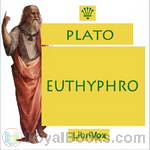 Euthyphro
Euthyphro
Awaiting his trial on charges of impiety and heresy, Socrates encounters Euthyphro, a self-proclaimed authority on matters of piety and the will of the gods. Socrates, desiring instruction in these matters, converses with Euthyphro, but as usual, the man who professes to know nothing fares better than the man who claims to be an expert. One of Plato’s well-known Socratic Dialogues, Euthyphro probes the nature of piety, and notably poses the so-called Euthyphro Dilemma: Do the gods love a thing because it is holy, or is a thing holy because it is loved by the gods? | |
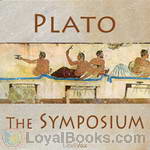 The Symposium
The Symposium
The Symposium (Ancient Greek: Συμπόσιον) is a philosophical book written by Plato sometime after 385 BCE. On one level the book deals with the genealogy, nature and purpose of love, on another level the book deals with the topic of knowledge, specifically how does one know what one knows. The topic of love is taken up in the form of a group of speeches, given by a group of men at a symposium or a wine drinking party at the house of the tragedian Agathon at Athens. Plato constructed the Symposium as a story within a story within a story... | |
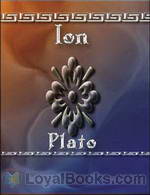 Ion
Ion
In Plato’s Ion, Socrates questions Ion on whether he should really claim laud and glory for his ‘rhapsodic’ recitals of Homer’s poetry. | |
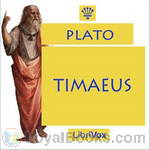 Timaeus
Timaeus
“Our intention is, that Timaeus, who is the most of an astronomer amongst us, and has made the nature of the universe his special study, should speak first, beginning with the generation of the world and going down to the creation of man…” ‘Timaeus’ is usually regarded as one of Plato’s later dialogues, and provides an account of the creation of the universe, with physical, metaphysical and ethical dimensions, which had great influence over philosophers for centuries following. It attributes the order and beauty of the universe to a benevolent demiurge – a ‘craftsman’ or god – fashioning the physical world after the pattern of an ideal, eternal one... | |
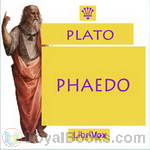 Phaedo
Phaedo
Plato's Phaedo is one of the great dialogues of his middle period, along with the Republic and the Symposium. The Phaedo, which depicts the death of Socrates, is also Plato's seventh and last dialogue to detail the philosopher's final days (the first six being Theaetetus, Euthyphro, Sophist, Statesman, Apology, and Crito).In the dialogue, Socrates discusses the nature of the afterlife on his last day before being executed by drinking hemlock. Socrates has been imprisoned and sentenced to death by an Athenian jury for not believing in the gods of the state and for corrupting the youth of the city... | |
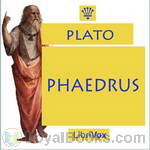 Phaedrus
Phaedrus
“For there is no light of justice or temperance, or any of the higher ideas which are precious to souls, in the earthly copies of them: they are seen through a glass, dimly…”Socrates and his earnest friend Phaedrus, enjoying the Athenian equivalent of a lunchtime stroll in the park, exchange views on love and on the power of words, spoken and written.Phaedrus is the most enchanting of Plato’s Erotic dialogues (capitalised in honour of the god). The barefoot philosopher urges an eager young... | |